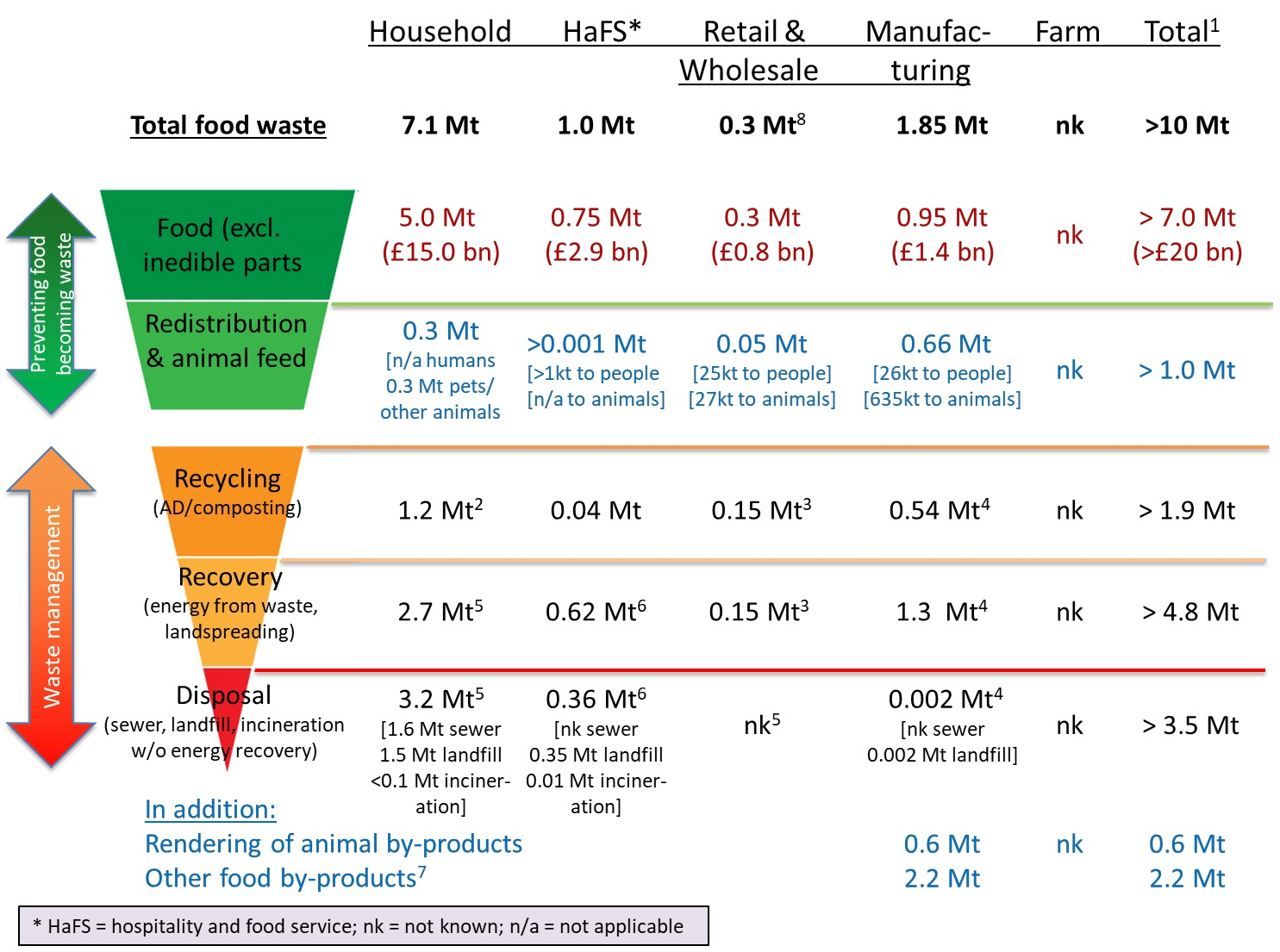Organic Waste
Overview
Organic waste is waste that is biodegradable, including Garden Waste and Food Waste[1].
Anaerobic Digestion and Composting are the best methods for dealing with organic waste, and is essential to diverting waste from landfill and producing renewable energy and sustainable fertilisers[1].
Macro Tonnage
The most recent information published by DEFRA [2] [3]identifies three categories of wastes that are generally considered to be organic and is part of the broader tonnage reported as UK Waste Tonnage:
| Reported by DEFRA as Generated in 2016 | Tonnes |
|---|---|
| Animal & Mixed Food Waste | 3,056,065 |
| Vegetable Wastes | 6,019,100 |
| Animal Faeces, Urine & Manure | 114,422 |
The final category is not relevant to household waste and local authority waste generally, but the other two categories have more significant tonnage that is split across primarily household, commercial and industrial tonnages as shown the in pie charts below:
The macro numbers above under-report the total organic waste put into the market as the macro numbers exclude tonnage in mixed categories and under report food waste at farm which may be ploughed back into fields without recording it as waste.
WRAP in their most recent report [4]identify over 10,000,000 tonnes of food waste, of which 7,100,000 tonnes was from household sources with the following graphic summarizing their findings:

The headers below presently only capture the tonnage collected and reported by local authorities through WasteDataFlow.
Green garden Waste Only
Below is a list of local authorities that sends more than 30000 tonnes of this material to a single waste operator.
| Authority | Stream | Facility | Operator | Address | Material | Tonnes | |
|---|---|---|---|---|---|---|---|
| Cheshire West and Chester | Green waste | Windrow or other composting | George Whittaker And Sons ( Knutsford) Ltd | Bypass Road, Hapsford, Cheshire | Green garden waste only | 30,518.36 | {{{date}}} |
Mixed garden and Food Waste
Below is a list of local authorities that sends more than 30000 tonnes of this material to a single waste operator.
| Authority | Stream | Facility | Operator | Address | Material | Tonnes | |
|---|---|---|---|---|---|---|---|
| Cheshire East | Mixed green and food waste | In vessel composting | Biowise Limited | Leighton Grange FARM, Middlewich Road, Leighton, Cheshire East, | Mixed garden and food waste | 53,228.92 | {{{date}}} |
| East Riding of Yorkshire Council | Mixed green and food waste | In vessel composting | Biowise Ltd | Biowise Composting Facility, Albion Lane Site, Albion Lane, Willerby, East Yorkshire | Mixed garden and food waste | 41,452.23 | {{{date}}} |
| Fife | Mixed green and food waste | Anaerobic or Aerobic Digestion Segregated | Not Available | Not Available | Mixed garden and food waste | 38,664.18 | {{{date}}} |
| Stockport MBC | Mixed green and food waste | In vessel composting | SUEZ Recycling and Recovery UK Ltd | Bredbury Park Way, Bredbury Park Industrial Estate, Bredbury, Stockport | Mixed garden and food waste | 35,537.10 | {{{date}}} |
| Shropshire | Mixed green and food waste | In vessel composting | Agripost Ltd | Lower House, Cardeston, Ford, Shrewsbury, Shropshire | Mixed garden and food waste | 32,617.08 | {{{date}}} |
| Cambridge City and South Cambs Councils | Mixed green and food waste | In vessel composting | Amey Cespa ( East ) Ltd | Waterbeach Waste Management Park, Ely Road, Waterbeach, Cambridgeshire | Mixed garden and food waste | 30,058.21 | {{{date}}} |
Other Compostable Waste
Below is a list of local authorities that sends more than 2000 tonnes of this material to a single waste operator.
Waste food Only
Below is a list of local authorities that sends more than 2000 tonnes of this material to a single waste operator.
References
- ↑ 1.0 1.1 WRAP, 2017. Organics | WRAP UK. Wrap.org.uk. [online] [Accessed 5 Dec. 2019].
- ↑ Digest of Waste Resources 2018 reporting data from 2016
- ↑ UK Statistics on Waste 2019 updating some of the 2018 Digest with 2017 data
- ↑ WRAP Food Surplus and Waste in the UK - Key Facts
